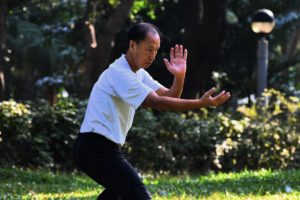Definition of Tai Chi

Tai chi (also written as T’ai Chi, Taiji, Tai Chi Chuan, etc.): an ancient Chinese exercise system (originating 2,000 years ago as a martial arts strategy) that uses gentle, slow, deliberate, meditative body movements (and carefully prescribed stances/positions) to achieve mental and bodily relaxation…Read more
Explore Tai Chi research in the following databases:
PubMed Trip Cochrane*
*The Cochrane database requires users to enter the search term manually. Enter “tai chi”
AI Search: Access Semantic Scholar’s results on tai chi.
Semantic Scholar
Learn more about our 3 research databases and AI search platform HERE.
Research Spotlight
The databases often return hundreds of medical studies for a single wellness approach. This section summarizes a sampling of five studies – providing just a taste of the available research.
- Tai Chi Proven to Reduce Risk of Falls in Elderly
A large, 2019 meta-review of 108 randomized controlled trials (23,000 participants) from Cochrane found that exercise that requires standing up and not sitting is a very good way to reduce falls in the elderly. The researchers found high-quality evidence that exercise reduces the rate of falls by 23 percent, with tai chi cutting falls by 19 percent.
Access this research on tai chi - Practicing Tai Chi Reduced Falls in Elderly People by 43%
A new meta-review of ten randomized controlled trials (University of Jaén, Spain, 2017) found that tai chi had a significant impact on preventing falls in older people. Practicing tai chi reduced falls by 43% in those followed for less than a year and by 13% in those followed longer.
Access this research on tai chi - Tai Chi Helps Enhance Cognitive Function in Older Adults
A 2014 NIH-funded meta-review conducted by the University of York, analyzing 20 studies involving 1,200+ people, found that a tai chi program enhanced cognitive function in older adults, with particularly significant impact on executive functioning in people without significant cognitive impairment. Researchers concluded “tai chi may be an attractive option for people interested in integrated long-term strategies for healthy aging.”
Access this research on Tai Chi - Tai Chi An Effective Strategy for Reducing Falls and Fractures in Older People
A methodologically strict 2014 Cochrane review analyzed 15 randomized controlled trials (totaling 79,193 participants), to establish which fall prevention interventions are most effective for older people. Researchers concluded tai chi effectively reduced risk of falls and fractures, although not necessarily the rate of falls.
Access this research on Tai Chi - Tai Chi Reduces Blood Pressure, Fall Risk, Depression and Anxiety in Older Adults
A National Institute for Health Research review of 35 randomized controlled trials (3,799 participants) concluded tai chi and qigong help older adults improve physical function, along with reducing blood pressure, fall risk, depression and anxiety.
Access this research on Tai Chi
Studies-in-Progress/Clinical Trials Underway
A clinical trial is any research study that assigns people to health-related interventions to evaluate the outcomes. “Interventions” include drugs, surgical procedures, devices, behavioral treatments, preventive care, etc.
- ClinicalTrials.gov: explore trials underway in the U.S.
- World Health Organization: explore trials happening across the globe. When you reach WHO’s search page, please type in “tai chi.”
Access all studies currently available for Tai Chi in these databases:
PubMed Trip Cochrane* Semantic Scholar
*The Cochrane database requires users to enter the search term manually. Enter “tai chi”























































